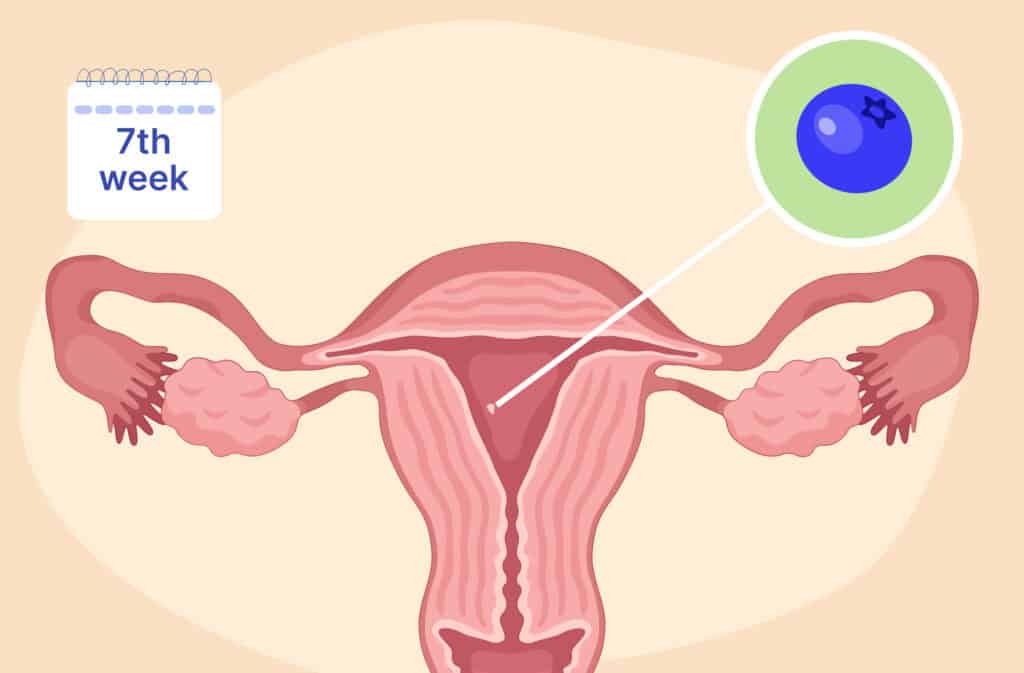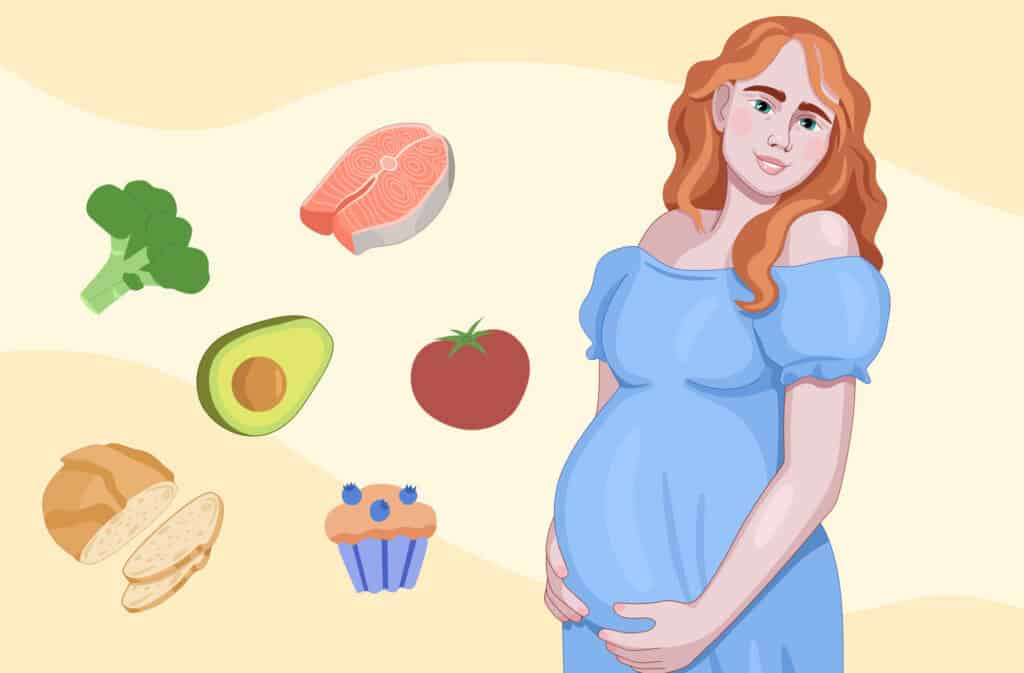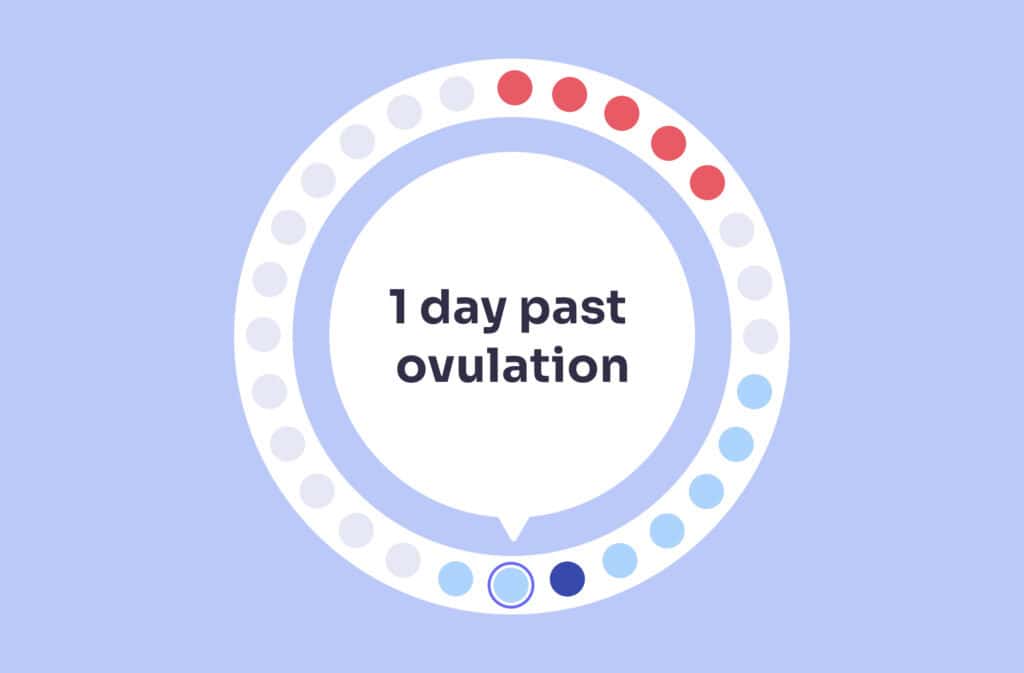Femia > Health Library > Pregnancy > Pregnancy week by week > Tiny heartbeats and big changes: What to expect at 7 weeks pregnant
Tiny heartbeats and big changes: What to expect at 7 weeks pregnant

- Updated Feb 10, 2025
- Published
CRAFTED BY HUMAN
Crafted by human At Femia, we provide accurate and up-to-date information at every stage of your journey, from trying to conceive, pregnancy and postnatal support. All content is created by a real person based on in-depth research and own professional experience. Femia ensures that you will receive expert advice, strict accuracy and a personalized approach from our authors/medical experts. Learn more about our editorial policy.
FACT CHECKED
Fact checked At Femia Health, we maintain the highest standards of editorial excellence in delivering content focused on helping you conceive, guiding you through pregnancy, and supporting you postpartum. Explore our content review principles to learn how we ensure the accuracy and quality of our health and lifestyle tips for every stage of your journey.
At 7 weeks pregnant, your baby’s organs and features are forming rapidly, and an ultrasound may reveal a tiny, beating heart. Symptoms like nausea, fatigue, and food aversions may increase as hormones rise to support pregnancy growth.
At 7 weeks pregnant, both you and your baby are going through big changes. This week, your baby’s development is accelerating, with organs, limbs, and facial features starting to take shape. For many, week 7 also brings more noticeable pregnancy symptoms, including fatigue, morning sickness, and heightened emotions due to rising hormone levels. An ultrasound at this stage might capture the first signs of a heartbeat—a major milestone in early pregnancy. Understanding what’s happening with your body and baby at week 7 can help you prepare for the journey ahead.
Track your symptoms with Femia and get tailored
health advice right on your phone
7-week pregnancy symptoms
Hormone levels continue to rise at week 7, leading to intensified symptoms. Here are some common experiences:
- Morning sickness and nausea: Nausea is often at its peak around this time due to hCG levels, which help sustain the pregnancy.
- Fatigue: Progesterone increases can lead to fatigue, making rest essential to support your body’s energy demands.
- Heightened sense of smell and taste: Many women report strong reactions to certain smells or tastes, which can contribute to food aversions.
- Breast changes: Breasts may feel tender, swollen, or heavier, and nipples may darken as the body prepares for breastfeeding.
- Frequent urination: Blood volume is increasing to support the baby, which leads to higher kidney activity and more frequent trips to the bathroom.
You can track your pregnancy using an app, like Femia, to note your symptoms.
👉Find out more: 6 Weeks pregnant: Key changes, health tips, and baby growth
Your body at 7 weeks pregnant
At 7 weeks, your body is working hard to support your growing baby. Increased blood flow, hormone production, and early changes in the uterus all help create a supportive environment for pregnancy. You may feel more tired and emotional than usual due to these shifts. Remember to listen to your body and get plenty of rest as these changes continue.
7-week pregnant belly
Though your belly may not look noticeably different, some women experience bloating due to hormonal shifts. Uterus expansion has begun, though it remains deep within the pelvis. Many physical changes are occurring internally at this stage rather than externally.
Baby development at 7 weeks pregnancy
The 7-week fetus is rapidly developing, with organs and structures becoming more defined. By this week, the baby’s brain and nervous system are forming, and the spinal cord is becoming more complex. Tiny arms and legs are beginning to sprout, and the heart is beating at approximately 90-110 beats per minute, a significant milestone in early pregnancy.
7-week fetus size
At week 7, your baby is around the size of a blueberry or a small grape, measuring about 1/3 inch (approximately 8-10 mm) in length. This tiny embryo is undergoing rapid cellular growth, setting the foundation for major organs and body structures.
7-week ultrasound
A 7-week ultrasound can reveal the gestational sac, yolk sac, and the developing embryo. 7-week ultrasound 3D technology can provide a clearer view of the tiny heartbeat and early formation of limbs and facial features, though this may depend on the ultrasound equipment available.
Real life 7-week fetus
In real life, a 7-week fetus is incredibly small but complex, with rapid development underway. The brain, heart, and major organ systems are forming, with initial limb buds visible. Although the embryo is tiny, major body systems are beginning to establish themselves.
👉Find out more:
8 Weeks pregnant: Symptoms, growth & baby’s development
Exploring week 9: What’s happening with your baby and what symptoms you might feel
Health tips and self-care at 7 weeks pregnant
- Focus on balanced nutrition: A balanced diet with lean proteins, whole grains, fruits, and vegetables supports energy and nutrient intake, helping manage nausea and cravings.
- Stay hydrated and rested: Fatigue is common, so prioritize hydration and rest to support your energy levels and overall health.
- Prenatal vitamins with folic acid: Continue with prenatal vitamins to support your baby’s neural development and protect against certain birth defects.
- Manage morning sickness: If nausea is intense, try eating small, bland snacks like crackers or ginger tea to ease discomfort.
Track your symptoms with Femia and get tailored
health advice right on your phone
Questions from the Femia community
How to form my pregnancy plate?
Aim for a balanced plate with lean proteins (like chicken or beans), whole grains (such as brown rice), fruits, vegetables, and healthy fats (like avocado or olive oil) to support you and your baby.
What are the top foods to avoid during pregnancy at week 7?
Avoid raw fish, high-mercury seafood, unpasteurized dairy, deli meats, and undercooked meat to reduce the risk of infection and toxins.
What can I do to manage mood swings at week 7?
Mood swings are normal due to hormonal shifts; try relaxation techniques like deep breathing, gentle exercise, or talking with loved ones for support.
The bottom line
At 7 weeks pregnant, your baby’s heart is beating, and rapid growth is taking place. You may experience intensified symptoms as hormones rise, preparing your body for pregnancy. Focusing on balanced nutrition, rest, and self-care can support you through these early stages of pregnancy.
References
- “7 Weeks Pregnant: Symptoms, Baby Development & Tips.” BabyCenter, www.babycenter.com/pregnancy/week-by-week/7-weeks-pregnant.
- “Week 7 of Pregnancy: Symptoms, Baby Development & More.” What to Expect, www.whattoexpect.com/pregnancy/week-by-week/week-7.aspx.
- “7 Weeks Pregnant: Baby Development, Symptoms & Tips.” NHS, www.nhs.uk/pregnancy/week-by-week/1-to-12/7-weeks/.
- “Pregnancy Week 7: What to Expect.” American Pregnancy Association, www.americanpregnancy.org/healthy-pregnancy/week-by-week/7-weeks-pregnant/.

Learn about the impact of nutrition on conception and pregnancy and explore a list of recommendations on foods to avoid.

Discover the complete week-by-week guide about the size and stages of the pregnant belly, how it grows, and what to expect during each trimester.

Learn what to expect at 1 day past ovulation (1 DPO), early pregnancy symptoms, and hormonal changes to help you navigate the early stages of conception. Expert advice from Femia.

